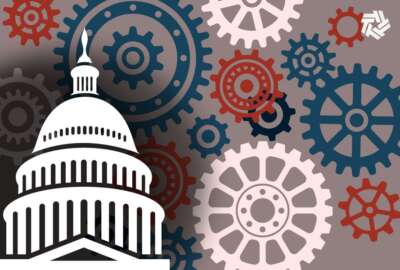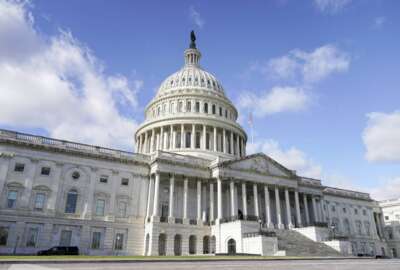Hubbard Radio Washington DC, LLC. All rights reserved. This website is not intended for users located within the European Economic Area.
FAQ: Federal pay and benefits questions answered as feds return to work
The Office of Personnel Management updated its operating status early Thursday morning to "open." OPM says furloughed employees are expected to return to work T...
By Jack Moore, Shefali Kapadia and Julia Ziegler
Federal News Radio
(This story was updated Oct. 18, 2013, at 1:10 p.m. to include information about new guidance from the Office of Personnel Management.)
The 16-day government shutdown is finally over and thousands of federal employees are now back on the job. But many feds still have lingering questions about how the shutdown will affect their pay and benefits.
Federal News Radio has combed through the legislation reopening the government and the latest OPM regulations to answer readers’ question. If you don’t see your question answered here, email us. We’ll update this article as more information becomes available.
Q: Will I receive back pay?
Back pay for all furloughed feds and excepted employees was guaranteed under the legislation signed into law early Thursday morning.
In guidance issued Oct. 17, the Office of Personnel Management says all employees will receive their rate of basic pay, which they would have received but for the lapse in congressional appropriations on Oct. 1.
Within-grade General Schedule increases that were delayed because of the shutdown are retroactive to the date they were originally scheduled to take effect.
Federal News Radio has received multiple emails from federal employees asking if they will be paid for the furloughs taken this summer due to sequestration. The law does not address pay for these furloughs.
Q: When will I get paid?
An OMB spokesperson said Thursday morning that, “back pay will be provided for [all] federal employees in their next paycheck.”
Employees paid by the Defense Finance and Accounting Service — civilian employees at the Defense Department, Veterans Affairs and some other agencies — will receive back pay in their next check on or around Oct. 25, according to spokesman Steve Burghardt. However, employees will have to make sure their time-and-attendance forms are submitted and approved on time, he said.
DFAS doesn’t anticipate any technical challenges in processing back pay, Burghardt said. DFAS never ceased operations because of the shutdown and remains fully staffed.
“It’s just a matter of folks making sure that their time sheets are submitted on time and approved,” he said.
At least one agency, the Social Security Administration, is planning to give its employees part of their retroactive pay before their next scheduled paycheck.
“Our working plan is that an initial payment for Oct. 1 through Oct. 5 will be deposited into employee accounts on Tuesday, Oct. 22, or Wednesday, Oct. 23. The payment will be a partial advance of the salary owed for Oct. 1-5,” stated an internal SSA email obtained by Federal News Radio.
Federal employees were paid for time worked through Sept. 30 — the last day before annual appropriations lapsed. However, feds’ most recent paycheck on Oct. 11 omitted pay for the first week of the shutdown.
Colleen Kelley, president of the National Treasury Employees Union, said NTEU is pushing for an interim paycheck to make up for lost pay from the shutdown instead of making employees wait for their next regularly scheduled paycheck on or around Oct. 25.
Q: Will the back pay bill cover pay for the Columbus Day holiday for all employees?
All federal employees will be paid for Columbus Day, according to OPM’s updated guidance. “Excepted” employees who worked on the holiday are eligible for holiday premium pay.
Also, if an employee was regularly scheduled to work on Columbus Day but, for whatever reason was furloughed, the employee is now entitled to holiday premium pay, according to OPM’s guidance.
Q: Will I be paid for overtime worked during the shutdown?
“Excepted” employees, who remained on the job through the shutdown, are eligible for overtime pay, according to OPM’s official shutdown guidance. It is not inconceivable that some feds will be able to take advantage of the extra pay, given that many agencies were operating with only skeleton staffs during the shutdown.
Excepted employees are also eligible to receive Sunday premium pay, night pay, availability pay and other premium payments, according to OPM’s guidance.
Also, employees who were regularly scheduled to perform overtime work or to receive other forms of premium pay, such as night pay, but were furloughed are still eligible for those premium payments, according to OPM.
Q: Will the shutdown affect my accrual of sick leave and annual leave?
Typically, if employees are placed in a nonpay status — a furlough, for example — for more than 80 hours in a biweekly pay period, they are not eligible to earn annual and sick leave for that period.
However, because the back pay bill retroactively restores all federal employees to pay status for the duration of the shutdown, their sick leave and annual leave will also be retroactively accrued, according to OPM.
Employees’ furlough days related to the shutdown will be treated as excused absences, according to OPM, and won’t eat up employees’ paid leave balances, such as sick leave or annual leave.
Q: If I received unemployment during the shutdown, do I have to pay it back?
Yes. Employees who applied for and received unemployment benefits will have 60 days to refund those benefits, according to the D.C. Department of Employment Services. (Click here for the full report on WTOP.com).
About 1,700 furloughed employees received benefits from D.C. totaling about $500,000 in benefits.
Payment plans of up to six months are also available. The department is using email, robocalls and snail mail to notify recipients. The department will seek to garnish the wages of employees who don’t pay up.
Q: Does the law address the 1 percent pay increase?
On Aug. 30, 2013, President Obama exercised his statutory alternative plan authority, granting federal employees a 1 percent pay increase in 2014. In order to block the pay raise, Congress would need to pass legislation specifically addressing the raise. The law passed Wednesday night does not include any mention of the pay raise, which, by default, still allows for the 1 percent pay increase come Jan. 1.
“The government shutdown was a real punch in the gut to federal workers who were already reeling from multi-year pay freezes, sequestration cuts and furloughs, as well as threats to health and retirement benefits. These hardworking public servants did not cause our economic crisis, but they paid a heavy price,” said Senator Ben Cardin (D-Md.) in a press release. “I’m proud we were able to fulfill our promise to make them whole again with back pay and finally break through the pay freeze with a modest adjustment for next year,” said Senator Cardin.
Of course, Congress does still have some time to address the issue before the Jan. 1 deadline.
Q: What’s in the bill?
The bipartisan measure passed in the House and Senate Wednesday night, and the president signed it into law early Thursday. It provides funding for federal agencies through Jan. 15 and extends the government’s borrowing limit through Feb. 7. It also provides funding for back pay for furloughed feds and essential employees that worked during the shutdown.
The bill passed in the Senate by a vote of 81-18 and in the House by 285-144. Obama signed the bill hours after the House gave final approval.
(Click here for more details about the bill.)
Q: When do I have to report back to work?
Federal employees now have the answer to their biggest question.
The Office of Personnel Management’s website provides the official operating status of the government. At 12:30 a.m. on Oct. 17, 2013, OPM posted the following notice on it’s website:
STATUS: OPEN
Due to the enactment of a continuing resolution, federal government operations are open. Employees are expected to return for work on their next regularly scheduled work day (Thursday, October 17th for most employees), absent other instructions from their employing agencies. Agencies are strongly encouraged to use all available workplace flexibilities to ensure a smooth transition back to work for employees (e.g. telework, work schedule flexibilities, and excused absence for hardship situations).
Office of Management and Budget Director Sylvia Burwell issued a memo to department and agency heads early Thursday.
“Today, the president signed a continuing resolution that brings employees back to work and reopens many government functions. All employees who were on furlough due to the absence of appropriations may now return to work. You should reopen offices in a prompt and orderly manner,” Burwell wrote in the memo.
In a statement released shortly after the memo, Burwell said, “In the days ahead, we will work closely with departments and agencies to make the transition back to full operating status as smooth as possible.”
NTEU’s Kelley said earlier Wednesday she gets the impression agency managers are willing to be accommodating toward employees as they return to work.
“Employees have just been through an unbelievable couple of weeks, through no fault of their own … there’s an understanding that employees have really been through a lot and that [managers] are going to work with them,” she said.
RELATED STORIES:
Congress passes deal to reopen government, bill heads to President Obama
Majority of feds worried about finances, survey says
Copyright © 2024 Federal News Network. All rights reserved. This website is not intended for users located within the European Economic Area.




